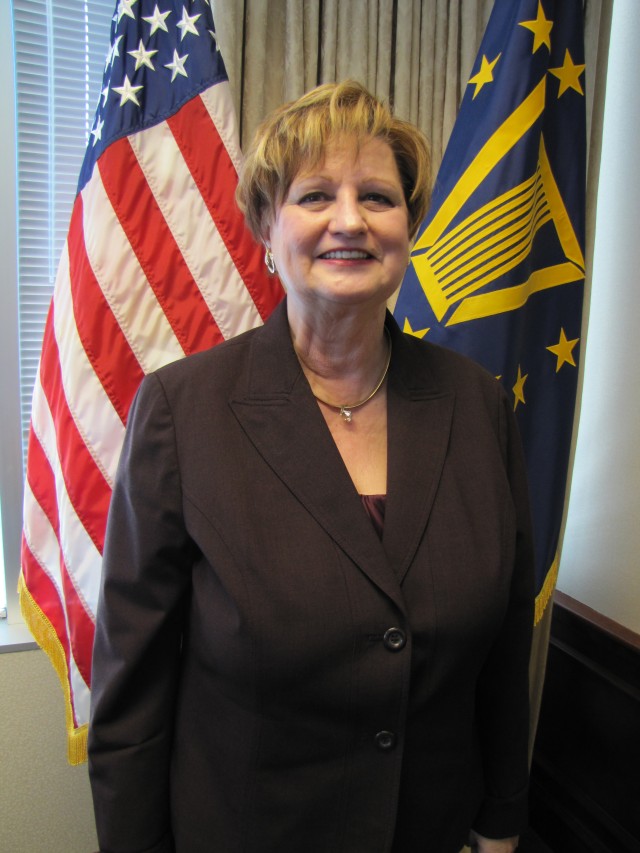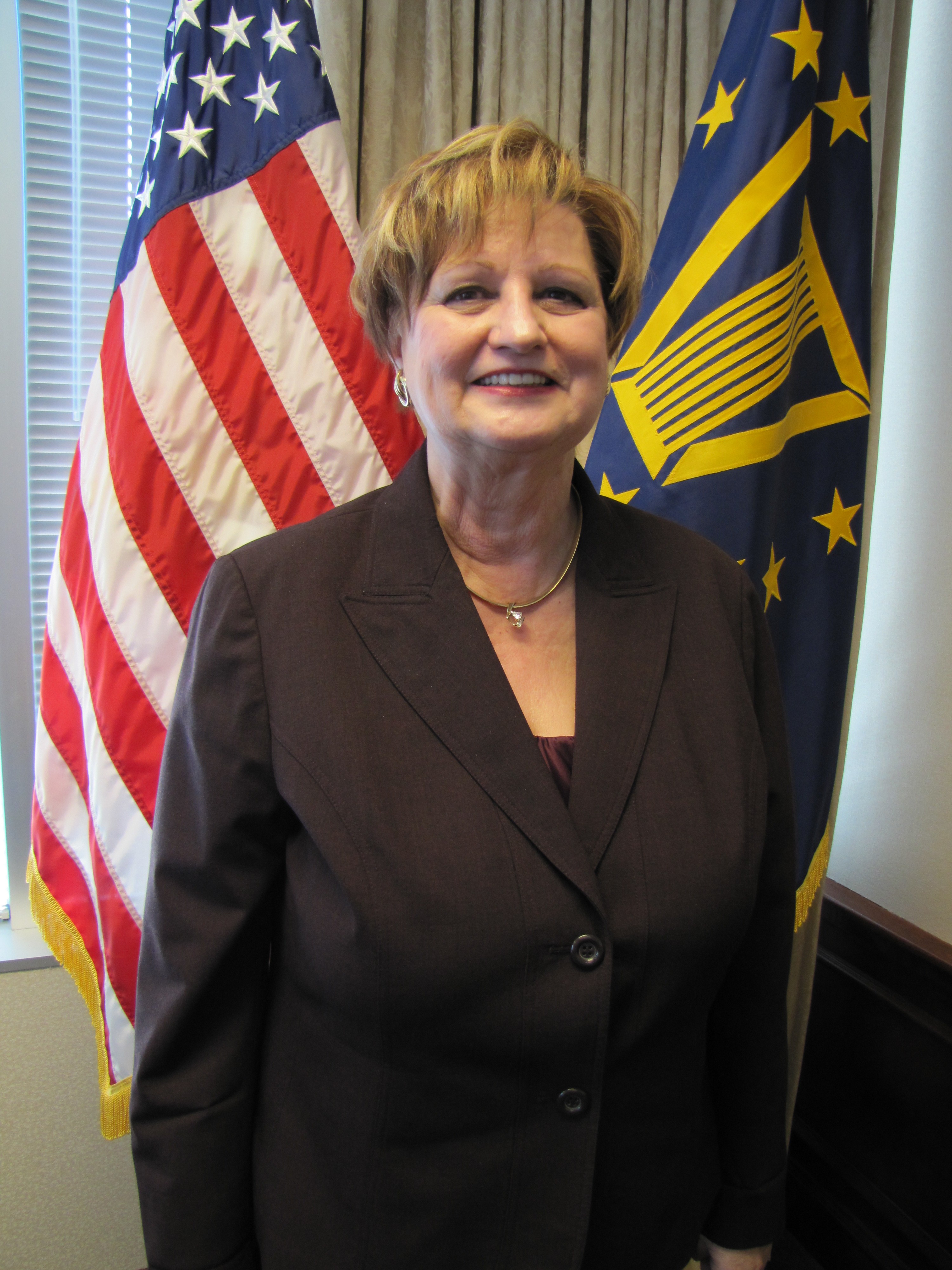REDSTONE ARSENAL, Ala. -- Marlene Cruze remembers the Soldier when she advises the 600 employees of the Aviation and Missile Command's Contracting Center.
Even though contracting activities at Redstone Arsenal may seem hundreds of miles from the battlefield, as far as Cruze is concerned it is the Soldier who feels the direct impact of the contracts employees negotiate and manage when acquiring aviation and missile systems.
So, if those contracts are not administered ethically, it's the same thing as firing an insult at the heart of a Soldier and their mission.
"If we do not obey the law and we let our ethics go to the side, we just spit in the face of the Soldier who died in Iraq," she said. "If we don't follow the rules and Constitution, and don't do things ethically, then we don't value the lives of our Soldiers."
As executive director of the AMCOM Contracting Center (formerly AMCOM Acquisition Center) since 1995, Cruze has worked at the helm of an organization that has established a reputation for the highest ethical and professional standards. It has been recognized by the leadership of the Department of Defense as one of the best contracting centers in the Army.
And that's saying a lot for an organization that manages hundreds of active AMCOM contracts annually exceeding the $20 billion and $100 billion marks.
But with that reputation also comes a level of success that makes it easier for Cruze to pass the yoke of responsibility onto the contracting center's next executive director. Cruze retired Friday, after 28 years serving in the Department of Defense.
"Saying 'goodbye' is an emotional thing," Cruze, 64, said. "But I've accomplished everything here that I set out to do. This is a highly professional organization. It's just time."
Cruze began her government career in 1982, when she went to Washington, D.C. as a presidential management intern, where she was able to choose the federal agency she wanted to work for and she chose the Navy. Her career began with the Naval Air Systems Command, where she worked in program management on the V-22 Osprey program for the Navy.
"One of the worst problems we had was with contracting," she recalled. "I made that observation and I was then challenged to come work in contracting. My Navy captain gave me the go ahead, and I discovered I had an affinity for what they were doing and an opportunity presented itself. I saw a chance to make a difference."
Cruze, who is dyslexic, has a mathematical brain. She was exceptionally gifted and often at the top of the class at Auburn University and then Georgia College, where she graduated in 1982 with a master's degree.
"I grew up dirt poor. I didn't have anything. I had no plans for college," she recalled. "It was the '60s. I knew I couldn't be a secretary because I couldn't type fast enough and I was terrible at shorthand. I went to college because I didn't think I could do anything else.
"Along the way, I discovered I could see everything mathematically. I took math in college to get good grades. I was always able to outmaneuver other students when it came to math."
In her career, Cruze was oblivious to the prejudices that many women of the time faced in the workplace, partly because her career took her to the D.C. area.
"One of the things about the D.C. area is that I didn't see a lot of prejudice over women and men and minorities," she said. "My mentor was Judith Vas Richardson. She was a GS-14. I was a GS-nothing. She really helped me because she was one of the few women who were successful at that time."
Vas Richardson was among many strong female role models who helped to shape the early years of Cruze's career. Two others were her grandmother, who built a career out of a love of sewing, and her mother, who supported three children on an award-winning photography career after her husband died.
"I overcompensated for things in my life and I worked hard," Cruze said. "But I never felt any prejudice. I was just so busy working that I never thought about it. And I didn't think about doing work that had never been done by a woman before. I never thought about it until I started becoming the first of everything.
"In the field I was in and working for the Department of Defense, all a woman has to do is work hard and be competent. I never felt judged except on my ability to do the job."
Her work ethic and analytical skills brought success for Cruze, who went on to contracting positions with the Navy's Naval Sea Systems Command and Naval Air Systems Command. At NAVSEA, she managed the contracting officers for the Navy's largest acquisition, which was the construction of nuclear powered ships to include the U.S. Nimitz class aircraft carriers, Trident submarines, Los Angeles nuclear submarines, the Navy's battleship reactivation program and the overhaul of nuclear submarines and aircraft carriers. She was also the Navy's contracting officer for acquisition planning and execution of the new class submarine Seawolf program, and she negotiated and awarded several multibillion dollar contracts for Navy ships and aircraft.
She then worked as the associate director for contract operations for the Army's Communications and Electronics Command, managing the acquisition personnel at Vint Hill Farms Station and Fort Belvoir Research and Development Center in Virginia, and providing direction for the execution of Army joint agency electronic warfare, satellite communications and other intelligence gathering agencies.
But there came a time when Cruze was ready to return closer to home. She found that opportunity at Redstone Arsenal, where she took over an acquisition center that bought missiles.
She came into an organization in 1995 that had a reputation of being the "absolute worst in DoD in terms of contracting prices, lead times, structures and processes. Nobody had an incentive to change anything," Cruze said.
Her work at Redstone, though, didn't start with numbers. Instead, it started with people. The first thing Cruze did was talk with the middle management employees.
"I talked to the G-12s and the G-13s because they are the backbone," she said. "I got a lot of information up front about what they saw in the center. Because of them, I could see what needed to be changed. And I set out to slowly make those changes."
She pinpointed three objectives that she wanted to achieve at Redstone - improving the promotion process (today there is a three-tier promotion process designed to pinpoint diversity, knowledge and expertise in top management), training employees to be multifunctional across all areas of contracting, and encouraging employees to get training outside of the contracting arena in areas such as logistics and program management.
"Knowledge was a big power play here," she said. "It's more important to understand all the pieces and integrate that understanding to win. If you understand all the pieces you can do better negotiating, you have a greater appreciation for your craft, and you can give better advice to your customers. When you know the pieces, you can give advice and make a difference."
Today, the AMCOM Contracting Center is one of the best in DoD. Shay Assad, the presidential appointee for DoD contracting, has said "the quality here is one of the best in DoD. He has made very, very positive comments about this organization," Cruze said. "In peer reviews, we get glowing remarks."
AMCOM Contracting Center employees are often hot commodities. It's not unusual for Cruze to see her employees accept contracting positions in other organizations.
"We're the training ground for the Navy, Corps of Engineers, Space and Missile Defense Command and now the Missile Defense Agency because we are the biggest organization with the best-trained contract employees. Our employees are very marketable," she said.
Even though losing qualified employees makes the operations of the contracting center more challenging, Cruze sees it as a high compliment to her organization.
"It's about empowerment. I believe in letting your employees do as much as they can where they are and letting them take ownership of their own career," she said. "It's amazing to see our employees do well wherever they go in their careers."
In retirement, Cruze isn't concerned about walking away from her own career of "firsts." However, she will miss the people of the contracting center.
"I love a lot of these employees. I feel like they are my children and I've watched them grow," she said. "I am pleased when they are successful. I feel like a real proud mama."
But it's her organization's success and her employee's success that has helped Cruze decide to retire to a farm life with her husband, Glenn, a retired Marine who also retired from a civilian career at Redstone last year.
"I always said I would never retire as long as someone's talking negative about this organization," she said. "Today, the challenges are not us. It's the environment. This is a very high achieving, professional, best-in-DoD organization."


Social Sharing